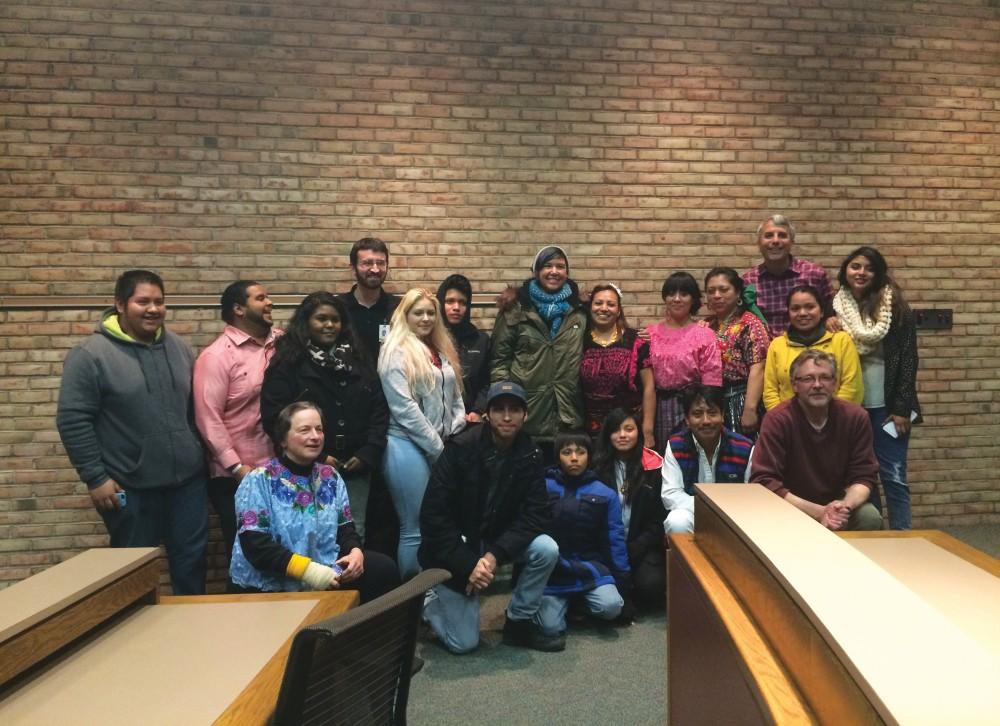Abrazos film brings new perspective on immigration

GVL / Courtesy – David Stark
Jan 25, 2016
As the presidential election continues to heat up, there will doubtlessly be much debate about immigration issues, with the most controversial being illegal immigration. A recent Latin American cultural event at Grand Valley State University aimed to broaden student perspectives on immigration by putting faces, names and stories to a topic that is often viewed in a vacuum.
“You hear all this talk about illegal immigration,” said David Stark, coordinator of GVSU’s Latin American studies program. “And yeah, these people are illegal immigrants, but you know what? They’re just desperate. They’re fleeing from poverty and violence. They just want to be safe.”
On Jan. 21, Stark and the Latin American studies program arranged a viewing of the documentary film “Abrazos” in the auditorium of the L.V. Eberhard Center. “Abrazos” depicts the story of U.S. children in Minnesota who have been separated from their families in Guatemala by the various hardships affecting the Central American country.
Stark said that economic recession, political violence and drug cartels are just some of the problems that have forced a mass emigration of children from Central America. He said that from October 2013 to October 2014, U.S. Customs and Border Protection encountered 67,000 unaccompanied children.
“We spend so much money keeping people out,” Stark said. “You can build fences and borders and everything, but I think the money’s better spent in helping these kids, in helping improve the conditions back in the Central American countries. If we improve conditions there, the people won’t need to flee and try and come here and risk their lives. That, to me, is the really sad part about this, is we’ve kind of misplaced our priorities.”
With the help of the organization Abuelos y Nietos Juntos, the children shown in “Abrazos” engage on an emotional 3,000 mile journey to Guatamala, where they meet, interact and learn from the family members they were separated from for so long.
After the film, there was a panel discussion featuring members of Bethany Christian Service, a global organization that works with unaccompanied youth, like those in “Abrazos,” to integrate them into American life in a way that allows them to learn a new culture while still preserving that of their native country.
Also among the panelists were several Guatemalans who face similar circumstances of familial separation as those seen in the film. One of these panelists was Jorge Velasquez, who had to leave his family in Guatemala five years ago. As translated by David Stark, Velasquez said that immigrants are unfortunately unified by many burdens.
“Thousands of Guatemalans live here in (the U.S.). We all come from a same root, a same origin, which is poverty,” Velasquez said. “That’s the reason we feel like we have to leave Guatemala and come here. And so, it’s very difficult for us to be here, as well, because we have to cover expenses back here and at home.
“Even at work we face difficult situations. Lots of hard work, low pay and, not everybody, but some of us experience discrimination at work. This is just part of a larger story that all immigrants share.”
Among the students in the audience was Jane Ulrey. Ulrey said that the event changed the way she views her daily life.
“It just made me realize that I never really thought about (familial separation),” Ulrey said. “Like how lucky I am that I get to go and see my grandma whenever I feel like it and I go home and see my sisters. It puts it in a completely different perspective.”
Stark said that changing individual perspectives is the best way to begin bringing about change regarding immigration issues.
“There are different ways we can bring about change. I think that you can bring about change just one person at a time,” Stark said. “I don’t think it’s the quantity; it’s the quality. If we just do this a couple of people at a time, I think that’s the way we can slowly make a difference.
“If we can break down the stereotypes, if we can challenge people’s perceptions: if we can do that, if we can just get people to open their minds a little bit. It’s part of GVSU’s mission to prepare students to be better global students, and this is one of the ways we can do that, is by helping students understand.”
Those looking for more information on how to help unaccompanied children and separated parents were encouraged to join the West Michigan Coalition for Immigration Reform on Facebook.





















